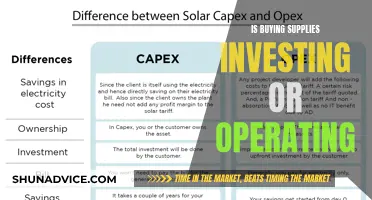
Artificial intelligence (AI) is rapidly transforming the way we live and work, and it is no surprise that many investors view the technology as an excellent long-term investment prospect. There are several avenues to explore when investing in AI, from individual stocks to exchange-traded funds (ETFs).
One option is to invest in companies that are leaders in AI technology, such as Amazon, Google, and Microsoft. These companies are not only at the forefront of AI but also have the financial muscle to continue developing it. Another option is to look for smaller companies with innovative AI solutions, which may have more growth potential but also carry higher risk.
It is important to do your research and analyse a company's financials, management team, and industry trends before making any investment decisions. Additionally, there are AI-focused ETFs available, such as the Global X Robotics & Artificial Intelligence ETF (BOTZ) and the AI Powered Equity ETF (AIEQ).
Investing in AI comes with potential risks, including the volatile and rapidly changing nature of the emerging technology, limited regulation in the industry, intense competition, ethical concerns, and technological limitations.
| Characteristics | Values |
|---|---|
| ETFs | Global X Robotics & Artificial Intelligence ETF (BOTZ), AI Powered Equity ETF (AIEQ) |
| Companies that are leaders in AI technology | Amazon, Google, Microsoft |
| Smaller companies with innovative AI solutions | SoundHound AI Inc. (SOUN), Procept BioRobotics Corp (PRCT) |
| Venture capital funds | N/A |
What You'll Learn

Exchange-traded funds (ETFs)
Invesco AI and Next Gen Software ETF (IGPT)
Tracks the STOXX World AC NexGen Software Development Index, which includes large-cap tech companies like Alphabet Inc., Nvidia, and Meta. The index targets 100 companies from across the globe that generate revenue from various forms of software and artificial intelligence.
Global X Artificial Intelligence & Technology ETF (AIQ)
Offers broad and comprehensive exposure to the entire AI value chain, with a tilt towards technology and mid-cap growth. It does not feature non-tech companies. For a 0.68% expense ratio, investors get exposure to 84 companies, including Nvidia, Qualcomm Inc., Netflix Inc., Meta, Alphabet, and Amazon. AIQ is also tax-efficient, with a low 0.16% 30-day SEC yield.
Global X Robotics & Artificial Intelligence ETF (BOTZ)
BOTZ is another AI-focused ETF offered by Global X. It has a similar expense ratio to AIQ at 0.68% but differs in its allocation. BOTZ has a lower allocation to software and cloud computing companies and a higher allocation to industrial and healthcare companies deploying AI and robotics. Nvidia is a top holding, and the ETF also features stocks like Intuitive Surgical Inc., which makes the da Vinci robot for minimally invasive surgery.
Roundhill Generative AI & Technology ETF (CHAT)
CHAT targets hardware and software companies developing or supporting generative AI development. This actively managed ETF currently has 51 holdings, with Nvidia, Microsoft, Alphabet, Meta, and Adobe Inc. in the top spots. It charges a 0.75% expense ratio.
First Trust Nasdaq Artificial Intelligence and Robotics ETF (ROBT)
ROBT offers pure-play exposure to AI by classifying potential holdings into three categories: enablers, engagers, and enhancers, based on their involvement in the AI ecosystem. The top 30 companies in each category are selected, and each is assigned a different weight within the ETF. ROBT charges a 0.65% expense ratio.
IShares Robotics and Artificial Intelligence Multisector ETF (IRBO)
IRBO is a cheaper alternative to the above ETFs, with a much lower expense ratio of 0.47%. It passively tracks the NYSE FactSet Global Robotics and Artificial Intelligence Index, equal-weighting a portfolio of around 100 global AI- and robotics-involved companies. This ensures greater diversification among small- and mid-cap stocks and a less top-heavy portfolio.
Defiance Machine Learning & Quantum Computing ETF (QTUM)
This ETF brings AI and machine learning to a range of industries by replicating the BlueStar Quantum Computing and Machine Learning Index (BQTUM). The fund captures returns from companies at the forefront of next-gen disruptive technology and machine learning. QTUM has a 0.40% expense ratio.
ROBO Global Robotics & Automation Index ETF (ROBO)
This ETF invests in companies focused on robotics, automation, and AI, including growth and blend stocks of all market capitalizations. It seeks to track the ROBO Global Robotics & Automation Index, which gauges the performance of companies engaged in these areas. ROBO has an expense ratio of 0.95%.
Madoff Victims: Lives Destroyed
You may want to see also

Large tech companies
Microsoft (MSFT): Microsoft has been investing heavily in AI, particularly through its partnership with OpenAI, the developer of ChatGPT. It has integrated ChatGPT into its Bing search engine and other products like Azure and Edge. Microsoft also has a stated goal of making AI technology accessible to all through its Azure cloud platform. Its stock has seen strong performance, and analysts expect its AI investments to boost revenue.
Alphabet (GOOGL): Alphabet, the parent company of Google, has been at the forefront of AI development for years. It launched its own AI chatbot, Bard, and has integrated AI into almost every facet of its business, from ad pricing to Gmail spam filters. Alphabet also offers AI tools and infrastructure through its Google Cloud platform. Its stock is attractively valued given its impressive technology, according to analysts.
Amazon (AMZN): Amazon has integrated AI into all aspects of its business, including Alexa, Amazon Web Services, and its e-commerce platform. It offers a wide range of AI and machine learning services to AWS customers. Amazon has also invested in AI startups like Anthropic, the maker of the AI chatbot Claude. Analysts believe AI integration has improved AWS cloud margins.
Meta Platforms (META): Meta, the parent company of Facebook, Instagram, and other platforms, has been investing heavily in AI as part of its long-term roadmap. It is building an AI model for its video ecosystem and has invested in Nvidia GPUs for its AI systems. Meta's massive user base provides unique value to advertisers, and its ad revenue per user is trending higher. However, it faces regulatory risks related to user data collection.
Nvidia (NVDA): Nvidia is a semiconductor company that provides the processing power needed for advanced AI applications. It has been one of the best-performing stocks in the market due to its AI exposure. Nvidia has unveiled new AI chips and platforms, such as the Nvidia Blackwell, that can perform tasks much faster than existing chips. It is also developing hardware and software for self-driving cars. Nvidia's stock has seen strong returns, but it faces competition and is exposed to the maturing PC market.
IBM (IBM): IBM has been developing its AI supercomputer, Watson, for years, with applications in healthcare, finance, law, and academia. It offers a range of Watson AI solutions to improve customer service, automate workflows, and predict outcomes. IBM has also been acquiring several AI companies to enhance its capabilities. Analysts believe its HashiCorp acquisition will improve its AI solutions infrastructure and security.
Roth IRA Vanguard Retirement: Investing in Your Future
You may want to see also

Smaller companies with innovative AI solutions
While investing in smaller companies with innovative AI solutions may carry more risk, it can also mean more growth potential. Here are some smaller companies with cutting-edge AI technology that you could consider for your investment portfolio:
SoundHound AI Inc. (SOUN)voice-based AI products, such as a voice assistant for restaurants that allow customers to place orders, ask about hours, and make reservations. Their clients include Hyundai, Pandora, Krispy Kreme, White Castle, Toast, and Square.
Procept BioRobotics Corp (PRCT)medical robotics solutions for urology. They offer two robotics systems: Aquablation therapy, which is an alternative to surgery, and AquaBeam, a heat-free robotic therapy to treat symptoms due to benign prostatic hyperplasia.
Arm Holdings (ARM): Arm Holdings designs chips and licenses those designs to partners like Nvidia, cloud infrastructure hyperscalers, and other chip makers. They collect royalties on the revenue from selling products with their designs. Arm Holdings has a unique business model and an advantage in the AI race because their chips are known for their power-efficient architecture.
Alteryx (AYX): Alteryx is a provider of data analytics software that empowers data workers to solve problems with a wide range of analytics and data science tools. Their Alteryx Intelligence Suite offers machine-learning capabilities, including automated modelling and natural language processing (NLP) to build models.
DocuSign (DOCU): DocuSign is an AI-powered leader in digital signature software that has made significant inroads into machine learning in recent years. In 2020, the company acquired Seal Software, an enterprise contract analytics company that uses machine learning for organizing and identifying risks and opportunities in contracts.
Lucrative Investment Opportunities: Exploring the Highest-Paying Ventures
You may want to see also

Venture capital funds
Where the Money is Going
According to the Organization for Economic Co-operation and Development (OECD), the United States and China attracted more than 80% of global venture capital investments in AI in 2020, followed by the EU (mainly Germany and France), and then the UK and Israel. This highlights the intense competition between the US and China in the AI space, often referred to as an "AI war".
Industries to Watch
The OECD study identified three leading industries for venture capital investments in AI:
- Driverless Vehicles and Mobility Technologies: This sector received $19 billion in VC funding in 2020, with a total of $95 billion invested between 2012 and 2020. 98% of these investments were made in companies based in China and the United States, indicating the strong belief in the potential of AI to revolutionize transportation.
- Healthcare, Pharmaceuticals, and Biotechnology: The pandemic acted as a catalyst for growth in this sector, with investments doubling from $6 billion in 2019 to $12 billion in 2020. AI is expected to play a significant role in healthcare, from drug discovery to personalized medicine.
- Business Services: This broad sector includes investments in creating more efficient processes and widespread automation. As AI continues to shape how businesses operate, we can expect further investments in this area.
When considering venture capital funds, look for those with deep expertise and interest in AI. Here are some notable VC funds that have shown a strong focus on AI:
- 8VC: A technology and life sciences investment firm that invests in AI-first companies, aiming to create long-term economic and societal value.
- Outset Capital: A seed-stage venture firm led by thought leaders in AI, with a mission to fund generations of AI-focused entrepreneurs.
- Bain Capital Ventures: A firm that invests in seed to growth-stage startups disrupting existing markets or creating new ones with technology.
- Zetta Venture Partners: A VC firm focused on AI-native startups, helping technical founders turn machine-learning models into market-leading companies.
- Gradient Ventures (Google's AI-focused VC fund): The venture arm of OpenAI, which also runs Converge, a highly selective program for engineers, designers, researchers, and product builders using AI to reimagine products and industries.
- Bloomberg's early-stage venture fund: Investing in startups focusing on machine learning and AI.
- Dropbox Ventures: A $50 million venture fund by Dropbox, focused on startups in the AI space, offering strategic partnerships and potential exposure to Dropbox's extensive user base.
- Sierra Ventures: An early-stage VC firm passionate about funding the next great artificial intelligence and machine learning startups, including Generative AI.
Remember to conduct thorough due diligence before investing in any venture capital fund, and ensure that you understand the risks involved in this dynamic and rapidly evolving field.
Pooling Funds for Apartment Complex Investments
You may want to see also

Machine learning stocks
- NVIDIA (NVDA): NVIDIA is a semiconductor company that has been at the forefront of AI since it started creating AI applications in 2012. The company develops software, chips, and AI-related services. NVIDIA's chips are widely used for running the powerful algorithms that form the backbone of AI applications.
- Microsoft (MSFT): Microsoft is a legacy tech company that has integrated AI into its products and services. It has a partnership with OpenAI, the company behind ChatGPT, and has embedded AI into its Azure cloud services and Microsoft 365.
- Amazon.com (AMZN): Amazon uses AI in its Alexa system and also sells machine learning and AI services to business customers through Amazon Web Services. Amazon's generative AI capabilities improve the customer experience, employee productivity, creativity, and content creation.
- Taiwan Semiconductor Manufacturing (TSM): As AI continues to grow, the demand for robust computing chips will also increase. TSM is the world's largest chipmaker and a global player in chip manufacturing for artificial intelligence.
- Adobe Inc. (ADBE): Adobe has infused most of its products and services with AI features, boosting its competitive advantage. Adobe's products are widely used for content creation, document management, digital marketing, and advertising software.
- SoundHound AI Inc. (SOUN): SoundHound AI creates voice-based AI products for the food service, automotive, and hospitality sectors. Its impressive client list includes Hyundai, Pandora, KrispyKreme, White Castle, Toast, and Square.
When investing in machine learning stocks, it is important to conduct thorough research and carefully consider the risks involved. It is also recommended to diversify your portfolio and not allocate a significant portion of your investments to a single stock or industry.
Crypto Investments: Legal or Not?
You may want to see also
Frequently asked questions
As an emerging technology, the AI market can be volatile and subject to rapid changes in investor sentiment. There is also limited regulation in the AI industry, making it difficult to predict future developments and assess risks. Intense competition among AI companies can lead to rapid changes in market share and profitability, and the technology itself is still developing, so some AI products may not live up to their potential.
Amazon, Google, and Microsoft are all large tech companies that are investing heavily in AI and have the financial muscle to continue developing it.
SoundHound AI, Procept BioRobotics, and C3.ai are smaller companies that are developing cutting-edge AI technology.
Alphabet (Google's parent company), NVIDIA, Amazon, IBM, and Microsoft are all heavily invested in AI research and development, and their products and services are being used in a wide range of industries.







